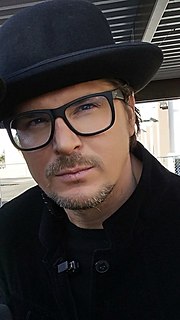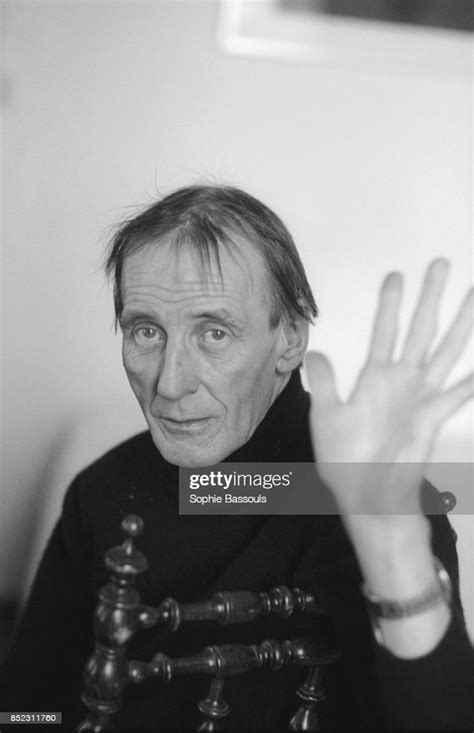A Quote by Zak Bagans
I think the reason people investigate the paranormal is because we are trying to overcome the mystery of death. That in and of itself is something that lives within every living person, everybody. We all experience death and we are forced to find out if that is just the end, which it is not. So what we do is, when we are experiencing a situation that maybe scary, it's almost now a sense of relief.
Related Quotes
When one existentially awakens from within, the relation of birth-and-death is not seen as a sequential change from the former to the latter. Rather, living as it is, is no more than dying, and at the same time there is no living separate from dying. This means that life itself is death and death itself is life. That is, we do not shift sequentially from birth to death, but undergo living-dying in each and every moment.
Death is not the end, but the beginning of a new life. Yes, it is an end of something that is already dead. It is also a crescendo of what we call life, although very few know what life is. They live, but they live in such ignorance that they never encounter their own life. And it is impossible for these people to know their own death, because death is the ultimate experience of this life, and the beginning experience of another. Death is the door between two lives; one is left behind, one is waiting ahead.
The religious man, the mystic, tries to explore the mystery of death. In exploring the mystery of death, he inevitably comes to know what life is, what love is. Those are not his goals. His goal is to penetrate death, because there seems to be nothing more mysterious than death. Love has some mystery because of death, and life also has some mystery because of death.
If death disappears there will be no mystery in life. That's why a dead thing has no mystery in it, a corpse has no mystery in it, because it cannot die anymore. You think it has no mystery because life has disappeared? No, it has no mystery because now it cannot die anymore. Death has disappeared, and with death automatically life disappears. Life is only one of the ways of death's expression.
The concentration camps, by making death itself anonymous (making it impossible to find out whether a prisoner is dead or alive), robbed death of its meaning as the end of a fulfilled life. In a sense they took away the individual’s own death, proving that henceforth nothing belonged to him and he belonged to no one. His death merely set a seal on the fact that he had never existed.
There is no single best kind of death. A good death is one that is "appropriate" for that person. It is a death in which the hand of the way of dying slips easily into the glove of the act itself. It is in character, ego-syntonic. It, the death, fits the person. It is a death that one might choose if it were realistically possible for one to choose one's own death.
I often like to think that our map of the world is wrong, that where we have centered physics, we should actually place literature as the central metaphor that we want to work out from. Because I think literature occupies the same relationship to life that life occupies to death. A book is life with one dimension pulled out of it. And life is something that lacks a dimension which death will give it. I imagine death to be a kind of release into the imagination in the sense that for characters in a book, what we experience is an unimaginable dimension of freedom.
I think to the degree writers are serious, there is a greater tendency for them to write to themselves, because they're trying to compose their own thoughts. They are trying to find out what is in their minds, which is the great mystery. Finding out who you are, what is in your head, and what kind of companion you are to yourself in the course of life. I do think people have very profound lives of which they say virtually nothing.
I don't necessarily view death as something negative. Death gives meaning to life. Living in fear of death is living in denial. Actually, it's not really living at all, because there is no life without death. It's two sides of the one. You can't pick up one side and say, I'm just going to use the 'heads' side. No. It doesn't work like that. You have to pick up both sides because nothing is promised to anyone in this world besides death.
The way we deny death says something about how we live our lives, doesn't it? At least in Sweden or Scandinavia, you don't have to search further back in time than maybe three generations to find another way to relate to death. People then had a different, closer relationship with death; at least it was like that in the countryside.
Misunderstanding may arise by confusing the Buddhist and scientific definitions of death. Within the scientific system you spoke quite validly of the death of the brain and the death of heart. Different parts of the body can die separately. However, in the Buddhist system, the word death is not used in that way. You'd never speak of the death of a particular part of the body, but rather of the death of an entire person. When people say that a certain person died, we don't ask, "Well, which part died?"
The greatest mystery in life is not life itself, but death. Death is the culmination of life, the ultimate blossoming of life. In death the whole life is summed up, in death you arrive. Life is a pilgrimage towards death. From the very beginning, death is coming. From the moment of birth, death has started coming towards you, you have started moving towards death.
































